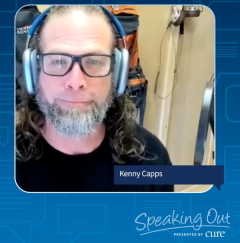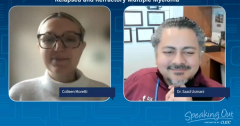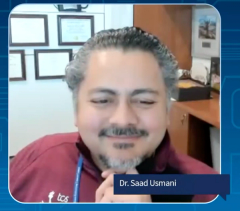
The Value of Staying Active During Multiple Myeloma
As a part of its Speaking Out Video series, CURE® spoke with Kenny Capps, from Throwing Bones for a Cure, about the importance of staying active during a multiple myeloma diagnosis.
Transcription: Colleen Moretti: Why is it important for patients with multiple myeloma to stay active during multiple myeloma?
Kenny Capps: So there's all sorts of reasons and most of these we know. There are all sorts of good reasons to be active in order to be healthier — whether it's affecting the overall survival rates of myeloma patients, or whether it's trying to just feel better which is probably the maybe the bigger advantage, this quality of life. So certainly, those are some pretty obvious and immediate benefits to doing this. But one of the values of it during treatment, and certainly before treatment, is putting patients in a place where they might be eligible for treatments they otherwise might not be eligible. Because if your health is a factor in whether you're even eligible for certain treatments, say a bone marrow transplant, then certainly there's some value in getting your body in the condition to handle that.
Moretti: Are these any exercises that patients with multiple myeloma can start with?
Capps: It's a tough one to answer because, especially if somebody who has not been diagnosed and I know that it's sort of a strange thing, and everybody's different. Myeloma at the average age at initial diagnosis is somewhere in your mid 60’s. So lots of us are experiencing different challenges thatwe've done to ourselves for life has just brought us over the years and so starting at ground zero or less than zero in trying to get healthier or trying to be more active, it's hard to jump into something right away without being concerned that you might injure yourself or maybe even setting yourself back a little bit. So the first step is probably to do an assessment to make a determination of where you are physically the physical limitations, whether it's strength, whether it's dexterity, whether it's in general resilience. So it's somewhere to start. And there's all sorts of things to do with and assessment. But I think that that's probably the first place to start before we even jump into an exercise program.
Moretti: Are there any resources or programs that Throwing Bones offer patients when it comes to staying active?
Capps: What we have right now on our website is a basic assessment, a self-assessment opportunity. It's really limited right now, we're in the beginning stages of that, in fact we just finally budgeted to our next phase of that which is empowering patients to do an assessment series based on some of the videos that we do have on our website. Again, we're in the very beginning stages of that. So, it will allow patients to determine what it is they can do, and all of these things are valuable to getting healthier. Meaning it's not just the physical clutter, but it's also the emotional and mental health component and also your nutrition. So maybe doing determination in where we're at and maybe the one of the best way to do that is a food journal; What is it I eat every day? What it is that I drink at different times? And what can I do in order to be healthier, but in order to do that you may need to have an objective viewpoint of where to go.
Moretti: After the assessment is taken and patients have an idea of where to go next, what are the next steps?
Capps: It's going to depend on the patient. And I know that one of the challenges that a lot of us have is feeling motivation or feeling confident enough to do these on our own. So maybe the best way to avoid that is not doing it on our own. It's finding resources and we certainly at Throwing Bones try to give some of those tools to you to find resources in your area to talk to people, and it's not always your oncologist. There are multiple people that need to be part of your team on being healthier, more active. Certainly, that includes your diagnosing physician, but it also includes people that might be handling some of the different issues that you have, whether it's nutrition, whether it's mental health, whether it's physiology, physical therapy, all of these things are super important. So, it's time to talk to somebody you can help you get there. And with regards to fitness, maybe that means talking to a personal trainer or coach.
This transcription has been edited for clarity.







